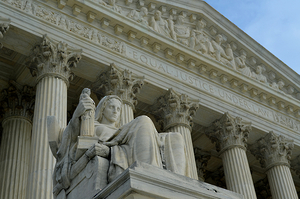US: Racial Discrimination Under Scrutiny
United Nations Committee to Review Record
The United States has failed to comply with key protections under the International Convention on the Elimination of All Forms of Racial Discrimination (ICERD), Human Rights Watch said. The US, which ratified the treaty in 1994, will appear before the UN Committee on the Elimination of Racial Discrimination for a periodic review of its record on August 13 and 14, 2014, in Geneva.

In its 22-page submission to the committee, Human Rights Watch documented discrimination in the criminal justice system, including racially disparate treatment of youth in adult courts; disparate enforcement of drug offenses; and a system of capital punishment that is linked to issues related to race.
“The United States is only taking half-steps in addressing race in its criminal justice system,” said Antonio Ginatta, US advocacy director at Human Rights Watch. “While working to address intentional discrimination, it does little to fix policies that result in glaring racial disparities.”
The ICERD treaty, to which 177 countries are parties, requires governments to prohibit any distinctions on the basis of race, ethnicity or national origin that have the “purpose or effect” of curtailing a person’s human rights. A violation can occur even without an intent to harm members of a particular race or ethnicity.
Human Rights Watch documented several racially disparate results stemming from US policies that lacked a clear intent to discriminate:
•Despite similar drug-use rates between whites and African Americans, African Americans are arrested for drug offenses at a much higher rate than whites, are more likely to be convicted, and are sentenced for longer terms;
•In 2014, half of all people executed in the United States were African American, though African-Americans constitute only 13 percent of the US population;
•Laws denying workplace protections in agriculture have a disproportionate impact on Latino children in the United States; and
•Decisions by US southern states to decline Medicaid expansion have a disproportionate impact on African Americans – with 57 percent of African Americans living in the US South.
Human Rights Watch also documented prohibited racial, religious, and ethnic profiling of American Muslims by the Federal Bureau of Investigation (FBI) and of Latinos by the US Customs and Border Protection agency.
“The challenge to eliminate the scourge of racial discrimination is a defining one for the United States,” Ginatta said. “The US should strive to make elimination of racial discrimination a reality, not just an ideal.”
Source: Human Rights Watch
- 336 reads
Human Rights
Ringing FOWPAL’s Peace Bell for the World:Nobel Peace Prize Laureates’ Visions and Actions

Protecting the World’s Cultural Diversity for a Sustainable Future

The Peace Bell Resonates at the 27th Eurasian Economic Summit

Declaration of World Day of the Power of Hope Endorsed by People in 158 Nations

Puppet Show I International Friendship Day 2020

